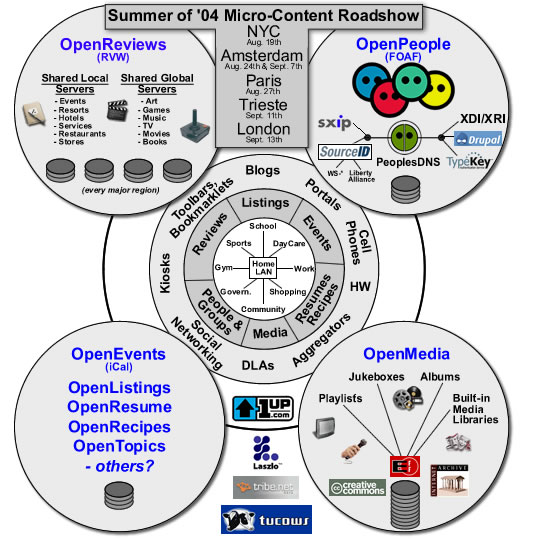| Friday, August 6, 2004 |  |
|
|
|
I might have accidentally looked at it once before, but didn't pay any attention before this article on CNN. Craigslist is a simple and funky looking site with classified adds. Started off in 1995 by one guy, Craig, sending out a daily e-mail with a jumbled collection of different items offered or sought. And then it gradually grew to something more, and that site, and a more organized, but still funky looking collection of stuff. OK, as I said, I didn't really pay any attention to craigslist, but my daughter, sitting next to me right now instantly recognizes the page and says:"Oh, craigslist? You can find everything on craigslist. Everything." And she goes on with a long list of things she's found there, and that other people she knows have found. Dates, photographers, free computers, etc.
Most listings are free on craigslist. Sofar only some of the job ads have been charged for. But that article mentions that they're going to start charging for all the job ads. Which the writer quickly guestimates to be a $25 million a year business. And there are 14 people working there. And they're thinking about an IPO. And they have one billion pageviews per month.
I mention it as a good small business success story. With a "why didn't I think of that" quality. Hey, I used to send out regular mailings in 1995 with assorted items that people offered or were looking for. And I could have made that site with both hands tied on my back. But Craig did, and stuck with it, so hats off to him.
[ Information | 2004-08-06 09:47 | | PermaLink ] More >
|
|
|
|
Marc Canter is going on a road trip. Well, I probably wouldn't have mentioned it if it wasn't for the t-shirt. A cool mind-map kind of thing on all things open and connected on the net, which Marc is a champion for.

Hey, I love it. Specific info here.
[ Information | 2004-08-06 09:45 | | PermaLink ] More >
|
|
| Tuesday, August 3, 2004 |  |
|
|
|
 Slashdot links to an article from 2002, called "August 2009: How Google beat Amazon and Ebay to the Semantic Web". A piece of fiction. But a surprisingly well done picture of a possible scenario for the web. Yeah, if Google played their cards well, they could pretty much control the earth in 5 years. Although control isn't the right term. Slashdot links to an article from 2002, called "August 2009: How Google beat Amazon and Ebay to the Semantic Web". A piece of fiction. But a surprisingly well done picture of a possible scenario for the web. Yeah, if Google played their cards well, they could pretty much control the earth in 5 years. Although control isn't the right term.
Lots of people talk about the Semantic Web. Basically it is that instead of just putting up free-form text, everything would somehow be marked up as to what it is. And various kinds of programs might them come along and extract some more meaning out of what is there. And potentially the whole web might get connected together in a much more dynamic and meaningful way. There are very smart people (I hope) working on standards that would make it possible. However, it is so complicated that most just ordinarily smart people don't quite get it. And so far there's nothing particular you can do with it.
Anyway, that article there actually does a fine job at explaining what it potentially might mean for regular people. And it outlines the quite real possibilitiy that somebody, like Google, might suddenly get together some tools that actually make it work on a large scale. And they might do it so well that it revolutionizes the way we do a whole lot of things, like how we buy and sell products.
The key is connected information, of course. If when you want to buy something, you can access all possible vendors of the product, and you know where they are, and you automatically can link it up with the satisfaction level of their customers, and any other factors you want to throw in, and you can get the list sorted any which way you want - you'd of course be stupid to just buy based on the first ad you run into that looks sort of interesting.
[ Information | 2004-08-03 11:33 | | PermaLink ] More >
|
|
| Saturday, July 24, 2004 |  |
|
|
|
 Adina Levin talks about tools for mass listening. Adina Levin talks about tools for mass listening.The second half of the 20th century was the era of "mass broadcasting" -- a few anchors spoke, and the rest of us listing. The first half of the 21st century is about "mass listening" -- more of us participating in public conversation, using new tools to discover those conversations, catalyze opinion-forming and political action. Many of the tools that bloggers like are for mass listening, rather than for broadcasting. A feed aggregator, of course. And Technorati, Daypop and Blogdex and many other sites that make it easy to pay attention to what many people are saying. "Mass listening tools can provide a richer perspective than polling, which captures answers to loaded, pre-defined questions." That's addressed to politicians and big companies. How about getting better tools for noticing what people actually are talking about, and be responsive to that.
[ Information | 2004-07-24 16:11 | | PermaLink ] More >
|
|
| Friday, July 23, 2004 |  |
|
|
|
Dan Bricklin writes about software that might last for a really long time. In many human endeavors, we create infrastructure to support our lives which we then rely upon for a long period of time. We have always built shelter. Throughout most of recorded history, building or buying a home was a major starting step to growing up. This building would be maintained and used after that, often for the remainder of the builder's life span and in many instances beyond. Components would be replaced as they wore out, and the design often took the wear and tear of normal living into account. As needs changed, the house might be modified. In general, though, you thought of a house as having changes measured in decades.
Likewise, human societies also create infrastructure that are built once, then used and trusted for a long period of time. Such infrastructure includes roads, bridges, water and power distribution systems, sewers, seaports and airports, and public recreational areas. These also would be used and maintained without major modifications after they were built, often for many decades or even centuries.
By contrast, software has historically been built assuming that it will be replaced in the near future (remember the Y2K problem). Most developers observe the constant upgrading and replacement of software written before them and follow in those footsteps with their creations. So, how about if we started building software as infrastructure that was meant to function for a great many years, despite changing conditions? Not that he provides the answers for exactly how to do that, but it is a call to think bigger.
It is not just about the software itself, of course. It is also about the format and media of data for example. A piece of paper can last hundreds of years. A digital CD surprisingly starts rotting within 10 years or so. It seems like we have access to 'everything' on the net and in various databases. But really we only have access to the most recent stuff, that happens to have been made in a recent format that still is popular. Only fairly rarely do we go back and convert the old stuff into the new formats.
Anyway, he specifically calls for the development of an different 'ecosystem' for societal infrastructure software. Certainly makes sense, as our societal infrastructure increasingly is totally dependent on databases and software. Makes the whole foundation of our society kind of shakey if it is based on pieces that stop working after only a few years.
[ Information | 2004-07-23 16:12 | | PermaLink ] More >
|
|
| Wednesday, July 21, 2004 |  |
|
|
|
 Is square A and B the same color or different colors? Want to bet? They ARE the same color, but almost all of us can't see it, before it has been proven to us, and we've stared at it another five minutes. Your brain is so good at filtering out the effects of shadows so that we can make the best possible guess at what we're seeing. So good that we actually can't see what is really there, but only what is supposed to be there. The illusion is most obvious in the large version. See here for the details, and proof of why it is so. If you still don't believe it, you'll have to download the image and cut out little pieces of it in a graphics program, and put them next to each other. Is square A and B the same color or different colors? Want to bet? They ARE the same color, but almost all of us can't see it, before it has been proven to us, and we've stared at it another five minutes. Your brain is so good at filtering out the effects of shadows so that we can make the best possible guess at what we're seeing. So good that we actually can't see what is really there, but only what is supposed to be there. The illusion is most obvious in the large version. See here for the details, and proof of why it is so. If you still don't believe it, you'll have to download the image and cut out little pieces of it in a graphics program, and put them next to each other.
[ Information | 2004-07-21 13:56 | | PermaLink ] More >
|
|
| Friday, July 16, 2004 |  |
|
|
|
 Hm, didn't get around to blogging for a week, which is unusual. For me it is a certain rhythm, that is real easy when I do it every day. Requires very little energy and flows effortlessly. But if I get out of it, either by traveling and not having access to my normal channels of information, or if I just get busy with something else for a few days, it is suddenly an effort to figure out how to start again. Hm, didn't get around to blogging for a week, which is unusual. For me it is a certain rhythm, that is real easy when I do it every day. Requires very little energy and flows effortlessly. But if I get out of it, either by traveling and not having access to my normal channels of information, or if I just get busy with something else for a few days, it is suddenly an effort to figure out how to start again.
Doesn't matter a whole lot. There's no change in how many people drop by my blog, really, as many of them come from search engines, and there's plenty of stuff in the archive. It is really just a psychological thing for the blog author.
Many people who think or talk about blogs, like at BlogTalk, worry about the phenomenon of bloggers who stop blogging. People present statistics that show that lots of people have abandoned their blogs, or projections that show that before too long there will be more abandoned blogs around than active blogs. So what? There's sort of an implied assumption amongst people who are blog advocates that everybody really ought to be doing it. Which isn't going to happen, unless a blog gets to be redefined as something else. A Personal Presence Portal maybe. But even then, a majority of people really have little interest in being more visible and present on the Internet. Lots of people try to be as invisible as possible. Blogging really appeals most to people who think of themselves as having something to offer to the world. Who have a message, or particular viewpoints on things, or something to sell, like themselves. Yes, you might just be writing your thoughts or taking pictures of the cheese sandwich you had for lunch, but the underlying factor is that you like sharing it, and you're happy with the attention. Maybe you only want the attention from a very limited group, like your friends or your family, but you're never posting things only for yourself, even if it works well to pretend that you are. It is a bit of a paradox. The focus is usually on you, and most people write kind of like they're speaking to themselves, not directly to anybody particular, and you're somehow just cataloguing what you're interested in, or what you're doing, but the format wouldn't work at all unless there was somebody to share it with.
Allan Karl writes about when a blog is dead. He shares his own anxiety about not blogging and mentions another article by Mary Hodder that notes that some people are travel bloggers, who write predominantly when they're traveling somewhere interesting. Which Allan often seems to do. So while this quick paragraph reduced my blogging anxiety for a fleeting moment due to the fact that for the past few months the majority of my active posts have happened while I have frolicked somewhere around this grand planet, the fact is I feel that like a newspaper, magazine or newsletter the key word is "periodical". Now define this as you wish but for me a blog is a published piece. And as such it should be updated on a regular and recurring interval. Hence, the result of my anxiety when I have a lapse of week (let alone a day) or two where the pressure (on myself) to blog mounts until I finally grapple with some material I feel to be of value and interest to readers of the Digital Tavern. Personally I usually have much greater difficulty blogging when I'm traveling, unless I end up somewhere with an always-on WiFi connection, and I have sufficient free time.
Stephanie Booth talks about (mostly in French) bloggers who stop blogging, picking up on some themes from BlogTalk. You know, there's the Blog Blues, which most bloggers recognize. The times when you feel you really should be writing something on your blog, but it doesn't flow, and you have an assortment of anxieties about that. And there's the phenomenon when you start that you feel you have no readers, so it is not worth it. You know, somebody's first post is "Test, test, test", and the second one is "Anybody there?". Nobody comments, and then the third message is "Well, guess I'll come back and try this some other time". And then they don't. It is of course a misunderstanding of what a blog is. It is not a chat channel. Nobody might notice you right away, and if you really aren't saying anything interesting, nobody's going to bother. And it takes a while to build up a network of people who care about what you write, if you don't already have them handy (your friends and family).
But I must note also that it works a bit differently in the blog environment I live in. The blogging program I wrote was originally meant just as a feature in the New Civilization Network. Members can set up a hosted blog without needing any kind of technical knowledge about how it works. A couple of hundred people have set up blogs with that, and a fairly high percentage (for the blog world at large) of them are still active. But many of them are fairly unaware of that larger blog world and don't think much about it. And that is in part because the blog comes with instant readership and aggregation of all the local blogs. There are pros and cons in that, but basically the deal is that there are few enough blogs there that quite a few people comfortably can read all of the postings every day. And new people will right away get welcoming comments and encouragement, no matter what they wrote about, no matter whether it was terribly interesting or not. And if they haven't posted for a while, somebody might come along and encourage them to do so. So one doesn't feel alone at all. But that also carries the potential drawback with it that one doesn't get any further, and one thinks that IS per definition one's audience. And a certain group-think develops where one feels one has to fit into that group, or one complains about other people writing stuff that isn't kosher for that group, etc. Worries that normal bloggers don't have, because they generally start from scratch and then connect up only with the people they somehow are aligned with, and they don't worry about the rest.
There a parallel (to the question of why people stop blogging) in NCN in that an occasionally recurring discussion is "why do people leave and what can we do about it?". NCN was in some ways a forerunner for online social networks like Ryze or Orkut. It had many cool features before anybody else did, and still has stuff you don't normally see. But nowadays it also a bit dated and disorganized, and still has a look that was ok in 1995, but which isn't particularly contemporary now. Anyway, as opposed to more generic online networks, it has a theme or focus, even if it is a big and all-encompassing one. Basically it was meant for people who want to change the world. So, more than 9000 people have signed up over the years, and many of them thought it was a good thing at one point or another, but now there's probably not more than maybe 100 people who're active. So, some people worry about what happened to the rest of them. Why did they get scared away, how can we avoid it, etc. What is special here is that, even though they often are dissatisfied with something about the place, the people who are there have a certain attachment to it, and in the back of their mind some kind of hope that it could be more than just a place to hang out, so they care. Probably a lot more than Hotmail or ICQ cares that the vast majority of people who created an account have abandoned it.
I can easily think of stickyness features for an online network site. Send people regular messages about how many people have looked at your profile, what messages are waiting for you, what postings are new, etc. And I need to finish implementing that for the network I did create. But, then, how about a stand-alone blog? Are there any personal sticyness features there? For my own blog, I have a graph of daily visitors in the side bar, a list of recent referrers (sites people came from), and a list of search engine searches that brought people there. There's the comments of course. And I religously watch Technorati or Bloglines to see who has linked to me. All of that is very motivating to keep posting. But only if you're already up and running and there's something worth visiting for others. If you just started a stand-alone blog and didn't post much, there will be no activity to make you motivated. There's of course aggregators. If your blog is associated with other people's feeds that you read, and a contact list, or blogroll, where you list other blogs your interested in, you'll keep being reminded of things to write about, and other people will find you, simply because they're mentioned by you.
Anyway, the answer might indeed be to bring more communication channels together in one place. If the blog is merely one integrated part of your interface to other people on the net, and there are many channels available, there doesn't have to be any stigma associated with not posting. You have to share *something* with *somebody* to be blogging, but what you share doesn't have to be some big article thing. It might be pictures, it might be your list of other websites, the feeds you're reading, the weather in your town, the books you're reading, the movies you've watched, or whatever. Not everything feels right for everybody all the time. So, if you have more channels of communication available, both incoming and outgoing, it is more likely that at least one of them will work for you.
[ Information | 2004-07-16 08:26 | | PermaLink ] More >
|
|
| Monday, June 28, 2004 |  |
|
|
|
Now, Google allows me to easily find a great many things I previous would have a hard time locating. If I know the name of something, I can learn about it very quickly. But it is still very difficult to find things I don't have good keywords for.
For example, I just thought about a letter I had seen somebody reference a while back, and I'd like to quote it, but I can't find it. It is peripherially on the subject of the state of education and how it might have been different at other times. There was this fellow in the 19th century, I believe, who was a school teacher and who wrote an application to be the editor of some dictionary or encyclopedia. He became the leader of the project, for decades. I forgot which dictionary or encyclopedia it was, though. And I don't remember if it was in the U.S. or in England. But it was mentioned on one of their main pages, as a historical note. His letter was at the same time rather humble, but also very impressive. He was just a teacher of some little small town schoolhouse, but he apparently had used his spare time for mastering a whole bunch of languages, particular romance languages, and other subjects. His letter is quite a gem of understated mastery. But all of that is too fuzzy for a google search, as I don't remember his name or any of the phrases he used. I need better tools. Or, hey, does it ring any bell with anybody?
[ Information | 2004-06-28 16:58 | | PermaLink ] More >
|
|
| Wednesday, June 23, 2004 |  |
|
|
|
 From Slashdot: From Slashdot:The Alexis de Tocqueville Institution is only one of a dozen different think tanks that have attacked Open Source. Why are all these think tanks so down on Open Source? Well, the Small Business Survival Committee is concerned that using open source will expose small business to the risk of lawsuits. Citizens Against Government Waste is concerned that the government might waste money on Open Source. Defenders of Property Rights is concerned that Open Source might be a threat to intellectual property rights. However, I was able to detect a common theme to all their criticism. They all seem to be funded by Microsoft." Oh, shocking, who would have thought?!? Now that I think of it, I can't remember any serious attack on open source that wasn't funded by Microsoft. But it seems that they've bought all those consultants and think tanks for much less money than the millions they used for propping up SCO, to try to sue open source out of existence.
[ Information | 2004-06-23 15:21 | | PermaLink ] More >
|
|
| Wednesday, June 9, 2004 |  |
|
|
|
Rebecca Blood mentions an article in the Economist. It is about governments trying to tax corporate profits, and multi-national companies cleverly avoiding it, by switching things around between countries. There is this little tidbit of information:60% of all international trade is between subsidiaries of the same company. Seems shocking somehow. Big companies just moving things around between different parts of themselves. I can guess that most of them are equally good at moving their profits around, until there's just a sufficiantly miniscule amount left to show, in a jurisdiction where corporations already pays little or no taxes.
[ Information | 2004-06-09 05:40 | | PermaLink ] More >
|
|
| Friday, May 14, 2004 |  |
|
|
|
 Today the Danish Crown Prince Frederik got married to Australian Mary Donaldson. Or, rather, from now on she is Crown Princess Mary. Today the Danish Crown Prince Frederik got married to Australian Mary Donaldson. Or, rather, from now on she is Crown Princess Mary.
Of course, nowadays monarchy is sort of old fashioned, royalty has no real power, and it is in danger of being completely irrelevant. But Denmark is not only the oldest kingdom in continous existence, the royals also happen to be unusually popular and well fitting their jobs. Queen Margrethe II is smart, articulate and artistic. She paints and designs stamps and costumes for theatre performances. She can sometimes be found walking around town like an almost normal person, even while much of her life is occupied with stiff public ceremonies.
Little of the kind of dirt and scandals that plague royalty elsewhere is found in Denmark. They're just a mostly positive and harmless focal point. The two sons of Queen Margrethe and Prince Henrik (who's French), Frederik and Joachim, are extremely well educated and enthusiastic representatives for their country. Joachim is married to Princess Alexandra who's from Hong Kong. And now Frederik finally got around to finding the right person. Which is no easy task when all the interests of the country and the monarchy need to be weighed against each other. Some royals decide to just go their own way, whatever public opinion thinks about it. But in Denmark they take it very seriously. Meaning that even though they no longer have to marry only members of the aristocracy, they still have to choose well. So, even know it has been known for a long time that Frederik and Mary were an item, nothing was officially admitted before everything checked out all around. And before Mary already could speak Danish.
We were glued to the screen all day. Luckily the Danish TV2 had a splendid video feed of 225kbits/s, which was almost as good as seeing it on TV. It was an elaborate fairy tale arrangement, of course, with much pomp and circumstance, carriage rides, parades, fancy dinner, wedding waltz, etc. And they just finished the fireworks
[ Information | 2004-05-14 17:12 | | PermaLink ] More >
|
|
| Thursday, May 6, 2004 |  |
|
|
|
Via Puzzle Pieces: Who Owns What from Columbia Journalism Review. An overview of what major media companies own. And, yes, we need ways of visualizing it.
[ Information | 2004-05-06 10:14 | 0 comments | PermaLink ]
|
|
| Wednesday, April 28, 2004 |  |
|
|
|
 I hadn't noticed it before, but in France there's a different way of renting cars. I'm recording it here so anybody else who don't know about it can check it out. It is called achat-rachat, i.e buy & buy back. It is a system the French government set up to lure tourists to France, and make them drive French cars, I suppose, by allowing car companies to lease out cars without taxes or duties to tourists. It is not a normal rental, but a lease arrangement run by the big car manufacturers. You get a new car, full insurance is included, with no deductable, no extra charges, no taxes, and they'll take care of the car as a car rental company would (or should, rather). You only need to be 18, several people can drive that car, and you can go all over Europe with it. But you must be a tourist with permanent residence outside Europe. And you have to arrange for the car weeks in advance, and the lease has to be for at least 17 days. That period would cost roughly the same as a normal car rental. But after that the price drops to considerably less, like 1/3-1/2. So if you need a car for a month, or several months, it beats car rental on all counts. And after the period is over, you just give it back. Or if you for some reason decided you wanted to buy that car, the lease you've paid would be deducted from the sale price. Check out Renault Eurodrive, Peugeot Eurolease and some general information. I hadn't noticed it before, but in France there's a different way of renting cars. I'm recording it here so anybody else who don't know about it can check it out. It is called achat-rachat, i.e buy & buy back. It is a system the French government set up to lure tourists to France, and make them drive French cars, I suppose, by allowing car companies to lease out cars without taxes or duties to tourists. It is not a normal rental, but a lease arrangement run by the big car manufacturers. You get a new car, full insurance is included, with no deductable, no extra charges, no taxes, and they'll take care of the car as a car rental company would (or should, rather). You only need to be 18, several people can drive that car, and you can go all over Europe with it. But you must be a tourist with permanent residence outside Europe. And you have to arrange for the car weeks in advance, and the lease has to be for at least 17 days. That period would cost roughly the same as a normal car rental. But after that the price drops to considerably less, like 1/3-1/2. So if you need a car for a month, or several months, it beats car rental on all counts. And after the period is over, you just give it back. Or if you for some reason decided you wanted to buy that car, the lease you've paid would be deducted from the sale price. Check out Renault Eurodrive, Peugeot Eurolease and some general information.
[ Information | 2004-04-28 14:34 | | PermaLink ] More >
|
|
| Friday, April 23, 2004 |  |
|
|
|
 From "Spiritual Emergency and the Triune Brain" by Grant McFetridge, here's a good description of the three parts of the human brain. From "Spiritual Emergency and the Triune Brain" by Grant McFetridge, here's a good description of the three parts of the human brain.
We start with a simplified version of the triune brain model, one without any controversial transpersonal elements, yet which is adequate for working with a number of spiritual emergence categories. A very neglected breakthrough in understanding brain biology forms the basis for this model. In the 1960’s Dr. Paul MacLean at the National Institute for Mental Health, expanding on the work of James Papez, described a three part concentric layering structure to the human brain. The outermost layer is the neomammilian brain, the neocortex which is the seat of thought and most voluntary movement. The next layer inward is the paleomamalian brain, composed of the limbic system, the seat of our emotions and autonomic nervous system. In the innermost portion is found the reptilian brain, composed of the the brain stem, midbrain, basal ganglia and other structures. Each brain serves different functions with some overlap, but what Dr. MacLean postulates is that the integration, or coordination between the brains is inadequate, a genetic problem in our species. For more information, see Evolutions End by Joseph Pierce, Three Faces of the Mind by Elaine De Beauport, and for summary information see Maps of the Mind by Charles Hampden-Turner. For a complete biological description see Dr. MacLean’s The Triune Brain in Evolution: Role in Paleocerebral Functions.
How does the triune structure of the brain apply to our inner experience? In everyday terms, we know these brains as the ‘mind’, ‘heart’, and ‘body’. Each brain has different biological functions and abilities. The ‘mind’, or neocortex, is the part of ourselves we most often think of as who we are. It perceives itself in the head, and it is the part of ourselves that forms judgments, handles short term memory, and does abstractions like mathematics. The ‘heart’ is the limbic system in the brain, yet perceives itself in the chest, probably because this is the area of it’s primary biological responsibility and sensory awareness. It allows us to feel emotions, and be either positively or negatively emotionally aware of the presence of others. Finally, the ‘body’ consciousness (or ‘hara’ in Japanese) is composed of the tissues at the base of our skulls, and probably other distributed systems in our body. It experiences itself in the lower belly, it’s area of major biological function. This brain gives us a sense of time and our ability to feel sexuality. We communicate with this brain when we do dowsing or muscle testing.
The most difficult conceptual jump in Dr. MacLean’s work is to realize that each of the brains is intelligently, independently self aware. Because we tend to assume thinking requires words, it’s difficult for us to realize that each brain actually thinks. In fact, unlike the mind, the heart thinks in sequences of feelings, and the body thinks in gestalt sequences of body sensations (described as the ‘felt sense’ in Eugene Gendlin’s Focusing). By this, I don’t mean that it’s as if there were three people inside of us. Instead, since each brain is so different, we might compare this situation to that of a living stereo system. Imagine if the speakers (mind), tape deck (heart), and receiver (body) were each self aware, each trying to run the show and puzzled because the other parts won’t do what they want them to. It would be hard to imagine how a stereo like this would ever manage to play music! And unfortunately, this is fairly close to the mark. Even though sharing much sensory data and awareness of each other’s actions, each brain tends to be in denial about the existence of the others. In fact, the brains often come into conflict, even to the point of overtly or unconsciously attempting to manipulate and control each other. A simple example to illustrate this occurs when you’re sexually attracted (the body consciousness) to someone you don’t even like (the emotional consciousness). Obviously, many of our problems in the world can be explained by that split, and the failure of our different parts to be in synch with each other. And, obviously, the answer is to work towards better integration and coordination. Not that I actually believe I really AM any of those parts of the brain, or that my consciousness originates in the brain. But they nevertheless represent a split between different types of consciousness that really ought to work together. And they represent aspects we need to encompass. Doesn't work if one identifies oneself only with one's mental thoughts, and believes that the other parts are inferior. In many ways they're more capable than the conscious mental faculties, which tend to make many mistakes, and which are prone towards arrogance.
[ Information | 2004-04-23 14:39 | | PermaLink ] More >
|
|
| Tuesday, April 20, 2004 |  |
|
|
|
 Very interesting article by Dave Cullen: "The Depressive and the Psychopath" about the conclusions made about what really went on in the minds of the Columbine killers. The mostly publicized story is that they were outcasts who had been picked on, and who were taking revenge against those who bullied them. And that their motivations otherwise are inexplicable. The conclusions reached by a group of FBI psychologists are both more horrifying and more enlightening and useful. Very interesting article by Dave Cullen: "The Depressive and the Psychopath" about the conclusions made about what really went on in the minds of the Columbine killers. The mostly publicized story is that they were outcasts who had been picked on, and who were taking revenge against those who bullied them. And that their motivations otherwise are inexplicable. The conclusions reached by a group of FBI psychologists are both more horrifying and more enlightening and useful.Fuselier and Ochberg say that if you want to understand "the killers," quit asking what drove them. Eric Harris and Dylan Klebold were radically different individuals, with vastly different motives and opposite mental conditions. Klebold is easier to comprehend, a more familiar type. He was hotheaded, but depressive and suicidal. He blamed himself for his problems.
Harris is the challenge. He was sweet-faced and well-spoken. Adults, and even some other kids, described him as "nice." But Harris was cold, calculating, and homicidal. "Klebold was hurting inside while Harris wanted to hurt people," Fuselier says. Harris was not merely a troubled kid, the psychiatrists say, he was a psychopath.
In popular usage, almost any crazy killer is a "psychopath." But in psychiatry, it's a very specific mental condition that rarely involves killing, or even psychosis. "Psychopaths are not disoriented or out of touch with reality, nor do they experience the delusions, hallucinations, or intense subjective distress that characterize most other mental disorders," writes Dr. Robert Hare, in Without Conscience, the seminal book on the condition. (Hare is also one of the psychologists consulted by the FBI about Columbine and by Slate for this story*.) "Unlike psychotic individuals, psychopaths are rational and aware of what they are doing and why. Their behavior is the result of choice, freely exercised." Diagnosing Harris as a psychopath represents neither a legal defense, nor a moral excuse. But it illuminates a great deal about the thought process that drove him to mass murder. The distinctions are very well worth understanding in detail. "Psychopath" isn't just a good thing to call people one doesn't like or who do something bad. There is something very specific that makes such a person different. In this case Eric Harris was the psychopath. It was not at all about simple revenge, and his aim was for something much grander than merely the most deadly school shooting in U.S. history. Because he was a person thinking differently from you and I.It begins to explain Harris' unbelievably callous behavior: his ability to shoot his classmates, then stop to taunt them while they writhed in pain, then finish them off. Because psychopaths are guided by such a different thought process than non-psychopathic humans, we tend to find their behavior inexplicable. But they're actually much easier to predict than the rest of us once you understand them. Psychopaths follow much stricter behavior patterns than the rest of us because they are unfettered by conscience, living solely for their own aggrandizement. (The difference is so striking that Fuselier trains hostage negotiators to identify psychopaths during a standoff, and immediately reverse tactics if they think they're facing one. It's like flipping a switch between two alternate brain-mechanisms.)
None of his victims means anything to the psychopath. He recognizes other people only as means to obtain what he desires. Not only does he feel no guilt for destroying their lives, he doesn't grasp what they feel. The truly hard-core psychopath doesn't quite comprehend emotions like love or hate or fear, because he has never experienced them directly.
"Because of their inability to appreciate the feelings of others, some psychopaths are capable of behavior that normal people find not only horrific but baffling," Hare writes. "For example, they can torture and mutilate their victims with about the same sense of concern that we feel when we carve a turkey for Thanksgiving dinner." Seems like it should be very important to find better ways of recognizing such people early. Shouldn't really be all that hard if it can be based on such rather clear criteria.
[ Information | 2004-04-20 18:46 | | PermaLink ] More >
|
|
| Tuesday, April 13, 2004 |  |
|
|
|
From Mopsos:Felix Oberholzer of the Harvard Business School and Koleman Strumpf of UNC Chapel Hill just completed an extensive empirical analysis of p2p sharing which concludes thatDownloads have an effect on sales which is statistically indistinguishable from zero. Now that's interesting. Is the battle for IP protection based on false assumptions? Could it be after all about maintaining a status quo, so that intermediates who used to provide a valuable service before P2P technology existed can still make money even though the value of the service they provide has reduced dramatically? Could it be? Maintaining the status quo? Why would the music industry do such a thing? Because they in danger of going extinct, that is, and their model no longer makes sense. It is close to being a lie that file sharing hurts their sales. The analysis figured that maybe 5000 file sharing downloads might make one of them decide not to buy a CD. And other studies show that file sharing in many cases increase sales, making people buy a CD they wouldn't have been aware of without file sharing.
[ Information | 2004-04-13 19:19 | 0 comments | PermaLink ]
|
|
| Friday, April 9, 2004 |  |
|
|
|
 Remember to send in your submission for the ‘Perfect’ Corporate Weblogging ‘Elevator Pitch’ Competition. Remember to send in your submission for the ‘Perfect’ Corporate Weblogging ‘Elevator Pitch’ Competition.A business executive, with whom you have been trying to arrange a meeting, is available for a condensed pitch from you on a one minute elevator ride.
It is your goal to convince this attentive business leader — who has heard about weblogs — to sponsor and resource a critical mass of weblogs in his/her organization so that their benefits can be demonstrated in a meaningful way. 50 to 160 words. The deadline is April 15th.
[ Information | 2004-04-09 09:58 | | PermaLink ] More >
|
|
| Tuesday, March 30, 2004 |  |
|
|
|
 Weblogsinc.com has a contest to come up with the perfect elevator pitch for corporate weblogging. You know, you're an enthusiastic weblogger yourself, and you think your company would draw great benefits from developing a weblogging culture, and now you're incidentally alone with the CEO for a minute while going up the elevator. What exactly would you say now that you have his full attention? Weblogsinc.com has a contest to come up with the perfect elevator pitch for corporate weblogging. You know, you're an enthusiastic weblogger yourself, and you think your company would draw great benefits from developing a weblogging culture, and now you're incidentally alone with the CEO for a minute while going up the elevator. What exactly would you say now that you have his full attention?
Judith Meskill is organizing the contest. I'm one of the judges, so I won't be submitting anything myself. But if you have an interest in corporate blogging, and you think you know how to present your case, go and fill in your submission.
You can find some tips about elevator pitches here or here. Some very good advice, if you ever have anything to present to anybody.
[ Information | 2004-03-30 21:30 | 0 comments | PermaLink ]
|
|
| Thursday, March 25, 2004 |  |
|
|
|
 Lawrence Lessig has a new book "Free Culture: How Big Media Uses Technology and the Law to Lock Down Culture and Control Creativity". Which you can buy or download for free under a Creative Commons. If you didn't know, Lessig is a law professor who's one of the most outspoken opponents of the alarming escalation of centralized corporate control of media, as well as a proponent for more flexible ways of dealing with copyrights. Lawrence Lessig has a new book "Free Culture: How Big Media Uses Technology and the Law to Lock Down Culture and Control Creativity". Which you can buy or download for free under a Creative Commons. If you didn't know, Lessig is a law professor who's one of the most outspoken opponents of the alarming escalation of centralized corporate control of media, as well as a proponent for more flexible ways of dealing with copyrights.
[ Information | 2004-03-25 14:50 | | PermaLink ] More >
|
|
| Monday, March 15, 2004 |  |
|
|
|
 From Synergic Earth News: From Synergic Earth News:Pop star George Michael is abandoning the music business to release his songs online for free instead. The multi-millionaire singer said he will never make another album for sale in record shops because he does not need the cash and does not enjoy fame. Fans will be given the option to make donations online in exchange for downloading the tracks, and the proceeds will be given to charity. He is promoting his latest album, Patience, which he said is his last. The 40-year-old star made his announcement during an interview with Jo Whiley on BBC Radio 1. Speaking about his decision, he said: "I'm sure it's unprecedented, it's definitely unprecedented for someone who still sells records. "I've been very well remunerated for my talents over the years so I really don't need the public's money." He added that he hoped people downloading his music would donate to his favourite charities. Explaining his decision, the former Wham! frontman said: "It does two things - it takes the pressure off to have a collection of songs every so many years, which is what nearly killed me. "I'm not pretending I won't be famous any more, but in the modern world if you take yourself out of the financial aspect of things, you're not making anybody any money, you're not losing anybody any money. Believe me, I'll be of very little interest to the press in a certain number of years. I'll hopefully be a happier man, giving my music and also doing something really positive with my music if people are generous enough to donate to the site. I'll remove myself from all that negativity." Bravo. Great idea. Now, if I only liked his music. But does that mean it will be open source and/or public domain? His site crashed Mozilla for me, so I didn't get around to finding out. Such an act of gift giving would work best, of course, if anybody, on their own initiative, could decide to make a compilation of his music and distribute it in whichever way they found appropriate.
[ Information | 2004-03-15 08:54 | | PermaLink ] More >
|
|
<< Newer stories Page: 1 2 3 4 5 6 7 8 9 Older stories >> |

